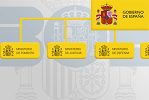Personal income tax
Categories of taxpayer for the purposes of income tax
How you are taxed depends on where you are a tax resident.
Your tax obligations are different depending on whether you are a resident for tax purposes in Spain or overseas. Taxpayers who are tax residents in Spain pay tax on their worldwide income. By contrast, taxpayers who are resident overseas are only taxed in Spain on the income considered to be obtained in Spanish territory. In both cases, taxation must take account of the provisions of any applicable double taxation agreement.
Natural persons who are resident for tax purposes in Spanish territory must pay personal income tax (Impuesto sobre la Renta de las Personas Físicas – IRPF). The tax year coincides with the calendar year, with no interruption due to a change of residence. Therefore, a natural person is either resident or non-resident for the whole tax year.
Natural persons and entities who are not resident in Spanish territory but who earn an income there must pay non-resident income tax (Impuesto sobre la Renta de no Residentes – IRNR). How this tax is imposed depends on whether the income is obtained through a permanent establishment located in Spanish territory![]() or without such a permanent establishment
or without such a permanent establishment![]() .
.
Natural person resident in Spain. Definition
Natural persons are considered resident in Spanish territory in any of the following cases:
- If they spend more than 183 days in Spanish territory in the same calendar year. When determining the amount of time spent in Spanish territory, sporadic absences are counted unless taxpayers can prove that they are resident for tax purposes in another country. In the case of countries or territories classified as tax havens, the tax authorities may ask for proof that the taxpayer has spent 183 days in the tax haven during that calendar year. In the case of countries or territories classified as non-cooperative jurisdictions (tax havens) (1), the tax authorities may ask for proof that the taxpayer has spent 183 days in the tax haven during that calendar year.
- If the main hub or base for their activities or economic interests is located in Spain, directly or indirectly.
- If the spouse (where not legally separated) and minor children who are dependent on the natural person have their habitual residence in Spain. Evidence to the contrary may be submitted in this third case.
Natural persons of Spanish nationality who provide proof of their new tax residence in a country or territory considered a non-cooperative tax jurisdiction will retain their status as IRPF taxpayers. This rule shall apply in the tax year in which the change of residence occurs and for the four subsequent tax years.
On the contrary, a natural person will be considered to be non-resident in Spain if they do not meet any of the above requirements.
Note (1): With effect from 11 July 2021, references to tax havens are understood as referring to the definition of a non-cooperative jurisdiction ( Annex IV![]() ).
).
Residency in two countries
A person may be considered to be resident in two countries where the national legislation of both countries applies. In such cases, the situation will be governed by the convention signed by the two countries, if one exists. Such conventions establish rules to prevent a person being considered resident for tax purposes in both countries. In general, under such rules persons are resident:
- In the country where they have their permanent home. If they have a permanent home in both countries, they are resident in the country in which they have the closest personal and financial ties.
- If this cannot be determined, they are resident in the country where they habitually live.
- If they habitually live in both countries, or in neither, they are resident in the country of which they are a national.
- If they are a national of both countries, or neither country, the relevant authorities will settle the matter by mutual agreement.
How to prove that you are a non-resident
You can prove that you are a non-resident by means of a certificate of residency in another country issued by the tax authorities of that country. Such certificates are valid for one year.
However, the validity of the certificate is undefined if the taxpayer is a foreign State, any political or administrative subdivision thereof or local authority thereof.
A person may have a residence permit or administrative residence in a country but not be considered a resident for tax purposes in that country.
Taxation and income tax returns
IRPF tax returns
The legislation on IRPF governs the circumstances in which you must file a personal income tax return. This must be checked every year as it is subject to amendments.
Use form 100![]() to file tax returns. Tax returns and confirmation of the draft tax return can be filed online via the Tax Agency’s website
to file tax returns. Tax returns and confirmation of the draft tax return can be filed online via the Tax Agency’s website![]() . Taxpayers who meet certain requirements may also confirm and file the draft tax return by telephone or at the Tax Agency's offices, by appointment in both cases.
. Taxpayers who meet certain requirements may also confirm and file the draft tax return by telephone or at the Tax Agency's offices, by appointment in both cases.
The deadlines for filing are generally from April to June, although they should be checked every year in case of slight changes.
Every year there is an information campaign on personal income tax returns, with a special section on the Tax Office website![]() containing information on all these aspects.
containing information on all these aspects.
IRNR tax returns in the case of income obtained without a permanent establishment.
Non-resident taxpayers must file an IRNR self-assessment for income obtained in Spanish territory. However, in general, they do not have to file a tax return for the following income:
-
Income for which tax has been withheld.
-
Income subject to withholding tax but exempt under the provisions of the Spanish Tax Law or an applicable double taxation agreement.
If a tax return has to be filed, form 210![]() must be used. The filing deadline varies depending on the type of income and the outcome of the tax return. It may be filed using the printed form generated from the Tax Office portal or directly online.
must be used. The filing deadline varies depending on the type of income and the outcome of the tax return. It may be filed using the printed form generated from the Tax Office portal or directly online.
IRNR tax returns in the case of income obtained through a permanent establishment.
A person is deemed to be carrying out economic activities operating through a permanent establishment in Spanish territory where, for whatever purpose, they have, continuously or habitually, facilities or workplaces of any kind in that territory in which all or some of their activity takes place, or where they act in that territory through an agent authorised to conclude contracts, in the name of and on behalf of the non-resident, who habitually exercises those powers.
In particular, the following are considered to constitute a permanent establishment: places of management, branches, offices, factories, workshops, warehouses, shops or other establishments, mines, oil or gas wells, quarries, agricultural, forestry or livestock operations or any other place of exploration or extraction of natural resources, and construction, installation or assembly works lasting more than 6 months.
Where non-resident taxpayers carry out economic activities in Spain and have the right to invoke the application of a double taxation agreement signed between Spain and their country of residence, the specific article of the agreement defining a permanent establishment should be used to determine if the taxpayer is operating through a permanent establishment.
The form for filing a return is the same as the one used for corporation tax ( form 200![]() ) and the same deadlines apply, but form 206 is used for the payment or refunding of tax and the specific identifier code of the permanent establishments must be used.
) and the same deadlines apply, but form 206 is used for the payment or refunding of tax and the specific identifier code of the permanent establishments must be used.
Special category for workers, professionals, entrepreneurs and investors posted in Spanish territory
Natural persons who acquire tax residency in Spain as a result of being posted there may opt to pay their taxes by filing an IRNR return, whilst retaining their status as IRPF taxpayers, during the tax year in which the change of residence took place and for the five subsequent tax years if, under the conditions laid down in the regulations, they meet the following conditions:
-
Such persons must not have been resident in Spain during the 5 tax years prior to the tax year in which they moved to Spanish territory.
-
The move to Spanish territory must have taken place, either in the first year in which this category applies to them or in the previous year, as a result of any of the following circumstances:
-
A work contract, with the exception of the special work relationship of professional sportspersons regulated by Royal Decree 1006/1985 of 26 June.This condition will be considered to be fulfilled when an ordinary or special employment relationship, other than the one mentioned above, or a statutory relationship with an employer in Spain, is entered into. It will also be considered to be fulfilled when the employer orders the posting and provides a letter confirming the posting, or when, without being ordered by the employer, the work is carried out remotely, exclusively through the use of computers, telematics and telecommunications systems. In particular, this circumstance will be understood to be fulfilled in the case of employees who have the international teleworking visa provided for under Law 14/2013 of 27 September on support for entrepreneurs and the internationalisation thereof.
-
They have become a director of an entity. In the event that the entity is considered to be an asset-holding entity under the terms provided for in Article 5, Section 2, of the Corporate Income Tax Law, the director may not hold a share in that entity which would determine its consideration as a related entity under the terms provided for in Article 18 of Law 27/2014 of 27 November on Corporate Income Tax.
-
As a consequence of carrying out an economic activity in Spain that is classified as an entrepreneurial activity, in accordance with the procedure described in Article 70 of Law 14/2013 of 27 September, under the terms established in the regulations.
-
As a consequence of a highly qualified professional carrying out an economic activity in Spain, providing services to start-ups, within the meaning of Article 3 of Law 28/2022 of 21 December on the promotion of the start-up ecosystem, or carrying out training, research, development and innovation activities, receiving remuneration representing in total more than 40 % of the total business, professional and personal employment income.
-
-
Such persons must not obtain income which would be classified as being obtained through a permanent establishment situated in Spanish territory, except in the case referred to in paragraph b(3) and (4) of this section.
The taxpayer’s spouse and children under 25 years of age, or of any age in the case of a disability, may also benefit from this category; when a couple have children together but are not married, the other parent of those children may also benefit, provided that certain conditions are met.
To exercise this option, taxpayers must submit form 149![]() to the Tax authorities. They should also use this form if they wish to opt out of this category, or if they are no longer eligible to file under this category because of not meeting the applicable requirements.
to the Tax authorities. They should also use this form if they wish to opt out of this category, or if they are no longer eligible to file under this category because of not meeting the applicable requirements.
Personal income tax returns are filed using form 151![]() .
.
Specific optional procedures in respect of withholding tax in the event of a change of residence
Workers moving to Spain
Employees who are not liable for IRPF, but who will become liable to pay it following a move to Spanish territory, may notify the tax authorities of their change of status using form 147![]() .
.
Following the notification, where applicable the tax authorities will send the employee a statement showing the date from which IRPF tax will be withheld from his or her salary.
The employee gives the document to the payer of their income from employment so that, for the purposes of withholding tax, the employee is classified as an IRPF taxpayer.
Workers posted abroad by their employer
Employees who become liable for IRNR as a result of being posted abroad by their company may notify the tax authorities of their change of status using notification form 247![]() .
.
Following the notification, where applicable the tax authorities will send the employee a statement showing the date from which IRNR tax will be withheld from his or her salary.
The employee gives this statement to the payer of their salary so that, for the purposes of withholding tax, the employee is classified as an IRNR taxpayer.
Non-residents. Optional scheme for taxpayers resident in other Member States of the EU or EEA with which there are regulations on mutual assistance relating to the exchange of tax information:
There is an optional category for IRNR taxpayers who meet the following requirements:
- They are natural persons.
- Who can prove they are resident in another EU Member State, except residents of countries or territories considered by the regulations to be non-cooperative tax jurisdictions, or in an EEA Member State with which there are regulations on mutual assistance relating to the exchange of tax information.
-
Regarding their income:
-
At least 75 per cent of their entire income in the tax period is income from work and economic activity earned during that tax period in Spanish territory, or
-
They can prove that the income earned during the financial year in Spain was below 90 per cent of the minimum personal and family threshold that would have corresponded to them on the basis of their personal and family circumstances had they been resident in Spain, and that the income earned outside of Spain also fell below that threshold.
-
-
This income has actually been taxed under the IRNR category.
Purpose of this optional category
The aim is for actual taxation in Spain to be calculated in accordance with the rules on IRPF, without the person thereby losing their status as an IRNR taxpayer.
The resulting average tax rate will be applied to the part of the taxable amount corresponding to the income earned in Spanish territory.
If the above results in an amount lower than the amounts paid during the tax period by the non-resident taxpayer as IRNR on income obtained in Spanish territory, the excess will be refunded.
The corresponding average tax rate will be determined by the tax authorities. To this end, it checks that:
-
The request applying for the optional category has been submitted using the correct form.
-
Compliance with the conditions for application of the optional category has been verified.
How is the corresponding average tax rate determined?
This rate is determined taking into account:
-
All income obtained by the taxpayer during the tax period
-
Personal and family circumstances
-
The IRPF assessment scale
Appeals or complaints against tax assessments
The activity of the tax authorities is regulated.
Tax legislation provides that tax assessments issued by the tax authorities may be challenged by the parties concerned in the event of a disagreement, pursuant to Articles 222 et seq. of the Spanish General Tax Law![]() , and the relevant implementing regulation on administrative review. The statements notifying the result of a tax assessment always state how to appeal and include the relevant deadline.
, and the relevant implementing regulation on administrative review. The statements notifying the result of a tax assessment always state how to appeal and include the relevant deadline.
Anyone wishing to challenge the assessment must choose, within a maximum period of 1 month from the day following the date of notification, between:
-
An administrative appeal, filed in writing and addressed to the authority who issued the assessment, stating the arguments and attaching documents in support of the claims made, or
-
An economic-administrative claim before the corresponding Tax Disputes Board, which is independent of the Tax Office. With this latter option, the appeal will be filed with the authority who issued the assessment, who will forward the appeal to the competent court.
Both appeals may be filed via the Tax Office website![]() , using the digital signature systems permitted.
, using the digital signature systems permitted.
Information for each Autonomous Community









Andalucía Aragón Asturias, Principado de Balears, Illes Canarias Cantabria Castilla y León Castilla-La Mancha Cataluña Ciudad de Ceuta Ciudad de Melilla Comunitat Valenciana Extremadura Galicia Madrid, Comunidad de Murcia, Región de Navarra, Comunidad Foral de País Vasco Rioja, La
Legal and/or technical references
-
Questions concerning residence

-
Tax manual for non-residents

-
Tax return for residents (IRPF). Period for filing 2024 tax returns. Obligation to file a return, how to do so and deadlines

-
Tax returns for non-residents with a permanent establishment, form 210

-
Tax returns for non-residents without a permanent establishment

-
Spanish Tax Office: Tax manual for non-residents (March 2025)

-
Chapter 8 Non-residents residing in EU/EEA with effective exchange of information. Tax manual for non-residents

-
Chapter 9 Special optional procedure for withholding tax. Tax manual for non-residents

-
General Tax Law

-
General Tax Law implementing regulation on administrative review

-
General Regulation on measures and procedures for tax management and inspection and for the implementation of common rules on procedures for the application of taxes











